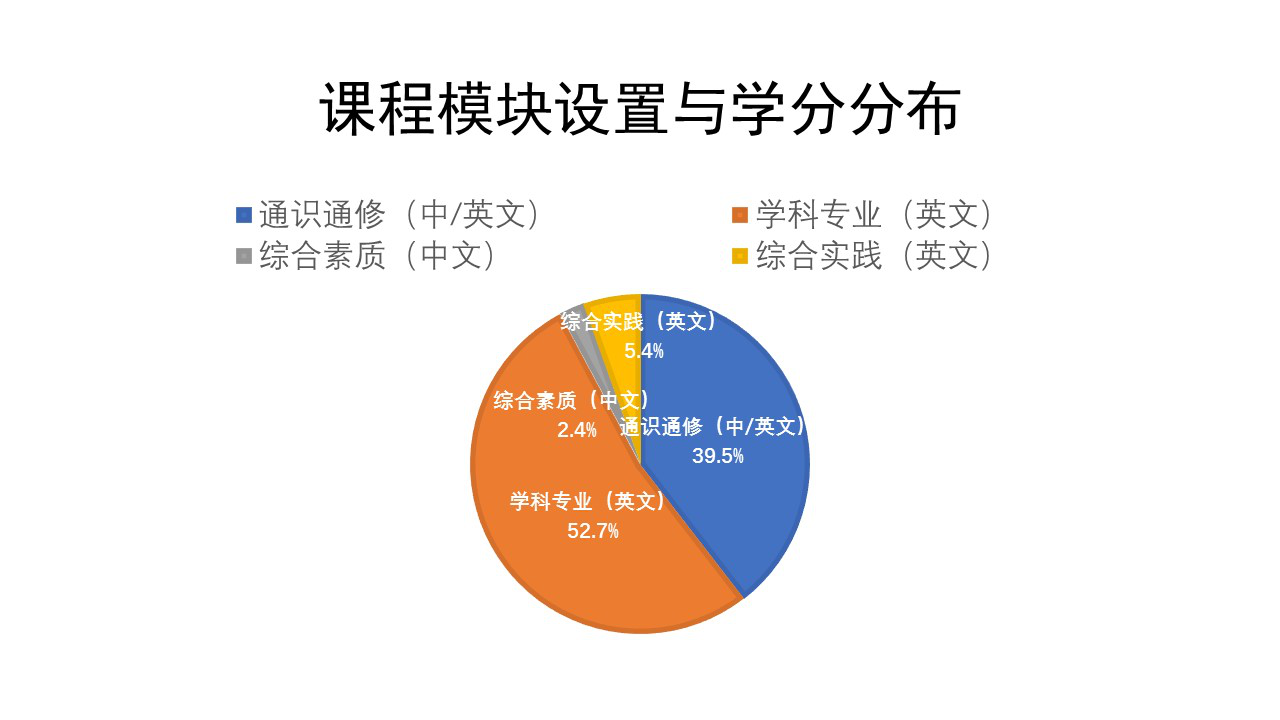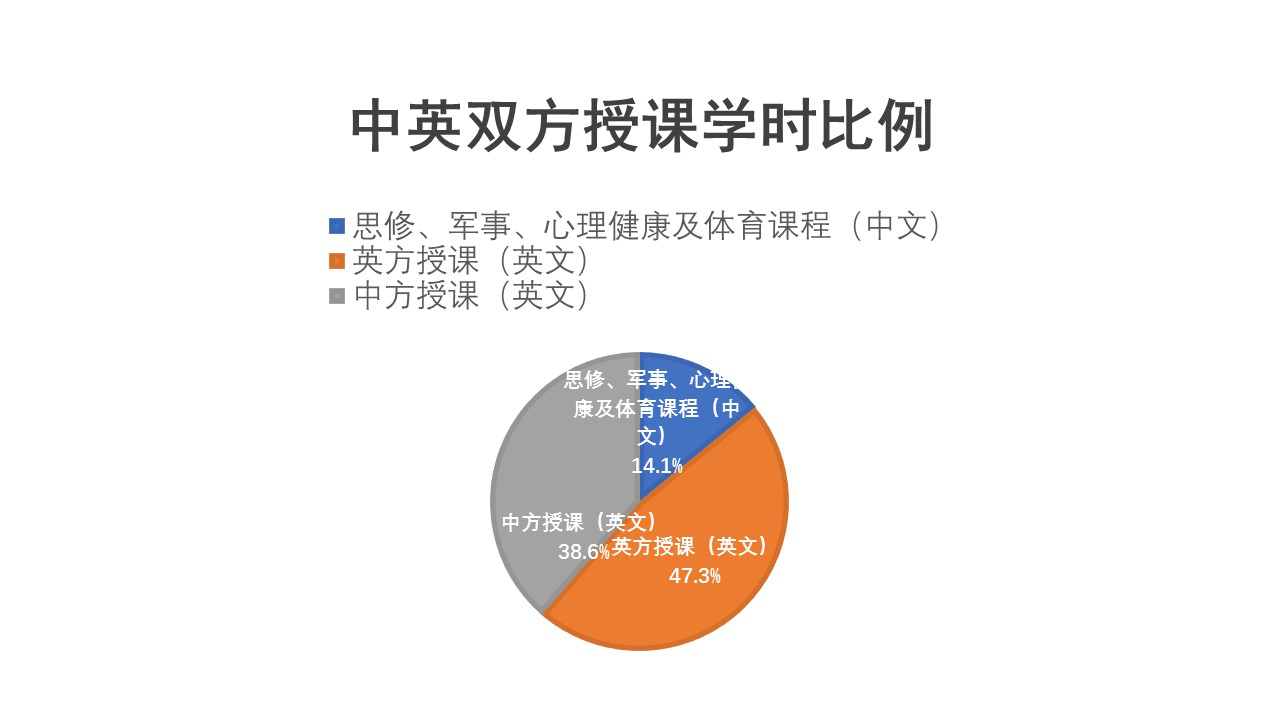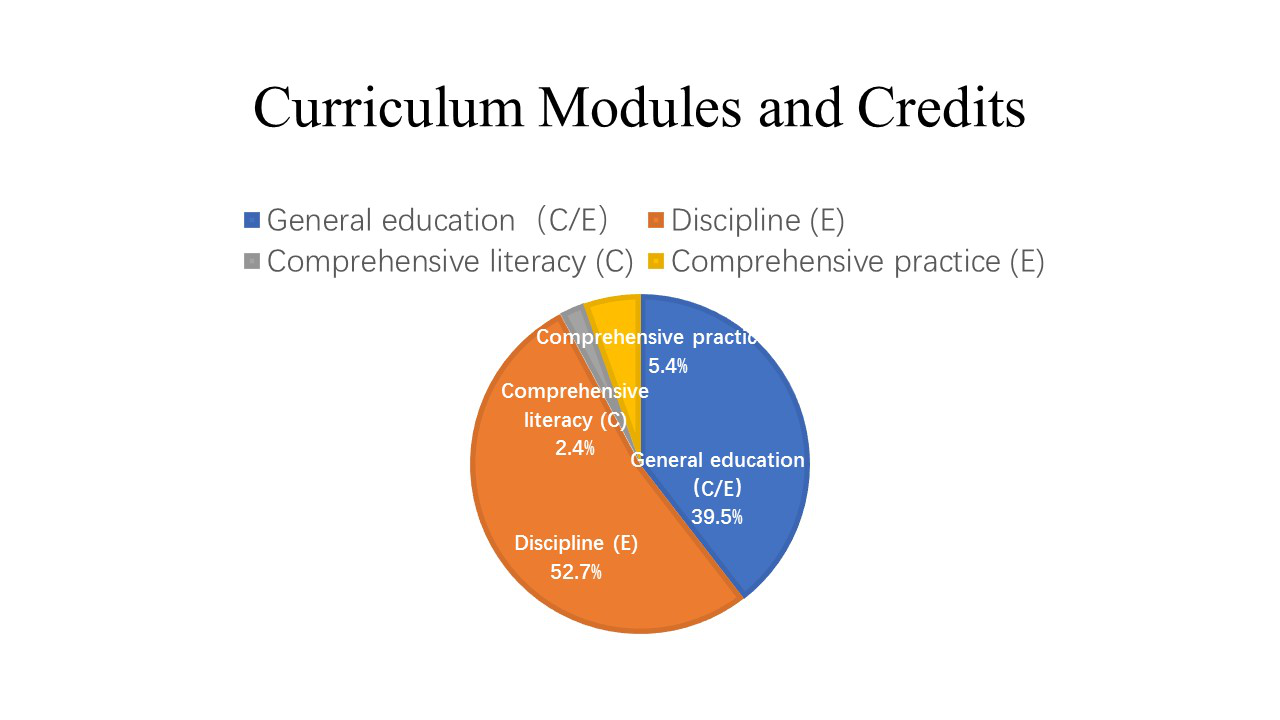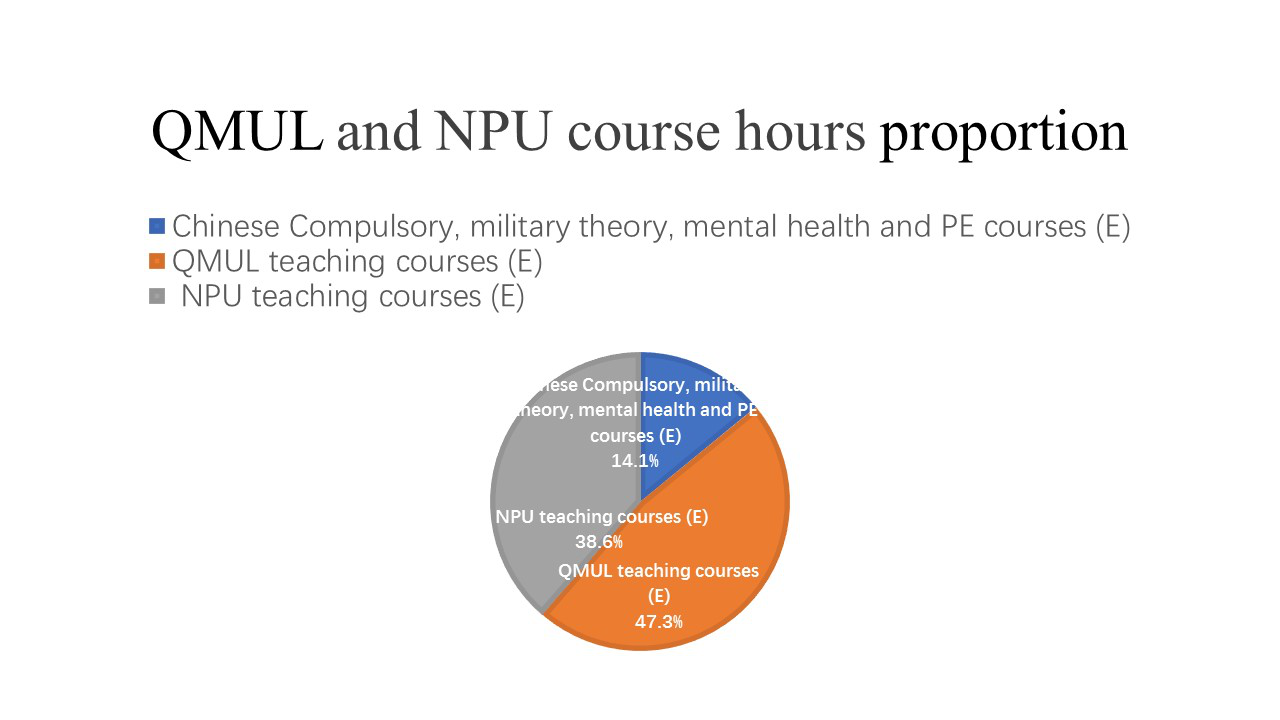本专业课程分为四大模块,其中:
◆通识通修模块22门课程,66.0学分/1122学时;
◆学科专业模块24门课程,86.0学分/1376学时;
◆综合素质模块最少3门课程,6.0学分/96学时;
◆综合实践2门课程,9.0学分/144学时;
除思政、军事理论、心理健康教育和体育类课程(23.5学分)外,其余课程中由英方授课79.0学分,中方授课64.5学分,引进课程包括英语,个人发展规划、14门学科核心课程,以及毕业设计,共20门,
◆引进外方课程门数(20门)总课程门数(51门)(超过1/3);
◆引进外方专业核心课程门数(14门)总专业核心课程门数(22门)(超过1/3);
◆外方教师承担的专业核心课程的门数(14门)总课程门数(51门);
◆外方教师承担的专业核心课程的学时数(824学时)总课程学时数(2738学时)。


(一)通识通修模块(共22门课程,66.0学分)
1. 思想政治理论课程(共5门课程,16.0学分)
课程编码 |
课程名称 |
学分 |
nxc2001 |
思政课i-中国近现代史纲要 |
2.0学分 |
nxc2002 |
思政课ii-马克思主义基本原理 |
3.0学分 |
nxc2003 |
思政课ii-思想道德修养与法律基础 |
3.0学分 |
nxc2004 |
思政课iv-毛泽东思想和中国特色社会主义理论体系概论 |
6.0学分 |
nxc2005 |
形势与政策 |
2.0学分 |
2. 军事课程(共2门课程,3.0学分)
课程编码 |
课程名称 |
学分 |
u34g11002 |
军事理论 |
2.0学分 |
u34p41001 |
军事技能训练 |
1.0学分 |
3. 心理成长与个人发展课程(共1门课程,0.5学分)
课程编码 |
课程名称 |
学分 |
u34g11001 |
大学生心理健康教育 |
0.5学分 |
4.职业规划与发展课程(共3门课程,10.5学分)
课程编码 |
课程名称 |
学分 |
qxu3111 |
个人发展规划i |
3.5学分 |
qxu4111 |
个人发展规划ii |
3.5学分 |
qxu5111 |
个人发展规划iii |
3.5学分 |
5.公共通修基础课程(共6门课程,13.0学分)
课程编码 |
课程名称 |
学分 |
qxu3101 |
英语i |
3.5学分 |
qxu3102 |
英语ii |
5.5学分 |
体育课第1-4学期为必修课,每学期为1学分。不同专业、不同体质、不同兴趣爱好、不同基础条件学生可以选择不同的项目。
课程编码 |
课程名称 |
学分 |
u31g71001 |
体育i |
1.0学分 |
u31g71002 |
体育ii |
1.0学分 |
u31g71003 |
体育iii |
1.0学分 |
u31g71004 |
体育iv |
1.0学分 |
6. 分层次通修课程(共5门课程,23.0学分)
课程编码 |
课程名称 |
学分 |
nxc3000 |
高等数学i |
5.5学分 |
nxc3004 |
高等数学ii |
5.5学分 |
nxc3002 |
线性代数 |
3.0学分 |
nxc3005 |
数学建模与计算 |
4.0学分 |
nxc3001 |
大学物理 |
5.0学分 |
(二)学科专业模块(共24门课程,86.0学分)
1. 学科基础课程(共2门课程,7.0学分)
课程编码 |
课程名称 |
学分 |
nxc4012 |
工程力学 |
3.5学分 |
nxc4008 |
工程设计方法 |
3.5学分 |
2. 专业核心课程(共22门课程,79.0学分)
课程编码 |
课程名称 |
学分 |
qxu4000 |
材料学i-结构与性能 |
3.5学分 |
qxu4006 |
材料学ii-加工与应用 |
3.5学分 |
qxu4001 |
材料分子学 |
3.5学分 |
nxc4010 |
功能材料概论 |
3.5学分 |
qxu4011 |
工程材料概论 |
4.0学分 |
qxu4007 |
材料学实验i |
3.5学分 |
qxu5017 |
材料学实验ii |
3.5学分 |
nxc4022 |
热力学与相变 |
3.5学分 |
qxu5002 |
材料化学 |
4.0学分 |
qxu5010 |
表面与界面 |
3.5学分 |
nxc5015 |
结构表征 |
3.5学分 |
nxc5026 |
金属i-变形与强化 |
3.5学分 |
qxu5030 |
复合材料 |
3.5学分 |
qxu5032 |
高分子材料物理性能 |
4.0学分 |
nxc5036 |
金属ii-合金与热处理 |
3.5学分 |
qxu6002 |
材料设计与选择 |
4.0学分 |
qxu6007 |
材料的环境性能 |
3.5学分 |
qxu6022 |
陶瓷 |
4.0学分 |
nxc6023 |
疲劳与蠕变 |
3.0学分 |
nxc6024 |
断裂力学 |
3.0学分 |
nxc6025 |
制造技术 |
4.0学分 |
qxu7027 |
可再生能源材料 |
3.5学分 |
(三)综合素质模块(共6.0学分,至少3门课程, 建议选修授课语言为英语的课程)
1. 科学素养类课程:包含三航概论、环境、生物等自然科学,其中在“航空概论”、“航天概论”、“航海概论”课程中必须三选一。
2. 经管法类课程:包含经济、管理、法学等
3. 人文素养类课程:包含哲学、伦理、历史、文化、语言、文学、社会、审美、人生与发展等
4.艺术素养类课程:包含《艺术导论》、《音乐鉴赏》、《美术鉴赏》、《影视鉴赏》、《戏剧鉴赏》、《舞蹈鉴赏》、《书法鉴赏》、《戏曲鉴赏》等课程。
建议学生选修英文授课课程,包含科学素养类课程、经管法类课程、人文素养类课程、艺术素养类课程四个模块,每学期开设的上述模块课程详见当学期选课手册。
(四)综合实践(共2门课程,9.0学分)
1. 毕业设计/论文(共1门课程,8.0学分)
课程编码 |
课程名称 |
学分 |
qxu6021 |
材料专业毕业设计 |
8.0学分 |
2. 科研训练(1.0学分)
包含创新创业项目、创新性实验项目、学科竞赛、高峰体验计划、科研实践类活动等。
并鼓励学生选择参与海外实习、课外实践、冬令营、夏令营等多种实践形式。
there are 4 modules in this major, as:
◆ general education module : 22 modules, 66.0 credits/ 1122 hours;
◆ discipline module: 24 modules, 86.0 credits/ 1376 hours;
◆ comprehensive literacy module: at least 3 modules, 6.0 credits/ 96hours;
◆ comprehensive practices module : 2 modules, 9.0 credits/ 144 hours;
except for ideological and political theory modules, military modules, mental growth and personal development modules and pe modules (23.5 credits), qmul taught modules are 79.0 credits, and npu taught modules are 64.5 credits, 20 introduced modules are english language, pdp, 14 discipline core modules and major project,
◆ numbers of introduced module (20) total module (51)(over 1/3);
◆ numbers of introduced major core module (14) total major module (22) (over 1/3);
◆ numbers of qmul teaching major core module (14) total module (51);
◆ class hours of qmul teaching major core module (824) total module (2738).


(1) general education modules (22 modules, 66.0 credits)
a. ideological and political theory modules (5 modules, 16.0 credits)
module code |
module name |
credit |
nxc2001 |
chinese compulsory courses i-essentials of chinese modern history |
2.0 credits |
nxc2002 |
chinese compulsory courses ii-marxism general principle |
3.0 credits |
nxc2003 |
chinese compulsory courses iii-ethics and fundamental of law |
3.0 credits |
nxc2004 |
chinese compulsory courses iv-fundamental of mao ze dong thoughts |
6.0 credits |
nxc2005 |
situation and policy |
2.0 credits |
b. military modules (2 modules, 3.0 credits)
module code |
module name |
credit |
u34g11002 |
military theory |
2.0 credits |
u34p41001 |
military training |
1.0 credit |
c. mental growth and personal development modules (1 module, 0.5 credits)
module code |
module name |
credit |
u34g11001 |
students mental health education |
0.5 credit |
d. career planning and development modules (3 module, 10.5 credits)
module code |
module name |
credit |
qxu3111 |
pdp i |
3.5 credits |
qxu4111 |
pdp ii |
3.5 credits |
qxu5111 |
pdp iii |
3.5 credits |
e. university general education modules (6modules, 13.0 credits)
module code |
module name |
credit |
qxu3101 |
english language i |
3.5 credits |
qxu3102 |
english language ii |
5.5 credits |
physical education is compulsory module in the first to the fourth semester, taking 1 credit every semester. students can freely choose different module according to their majors, physical conditions, interesting and physical basis.
module code |
module name |
credit |
u31g71001 |
physical education i |
1.0 credit |
u31g71002 |
physical education ii |
1.0 credit |
u31g71003 |
physical education iii |
1.0 credit |
u31g71004 |
physical education iv |
1.0 credit |
f. level-based general education modules (5 modules, 23.0 credits)
module code |
module name |
credit |
nxc3000 |
advanced maths i |
5.5 credits |
nxc3004 |
advanced maths ii |
5.5 credits |
nxc3002 |
linear algebra |
3.0 credits |
nxc3005 |
mathematical modelling and computing |
4.0 credits |
nxc3001 |
general physics |
5.0 credits |
(2) discipline modules (24 modules, 86.0 credits)
a. discipline elementary modules (2 modules, 7.0 credits)
module code |
module name |
credit |
nxc4012 |
mechanical modelling |
3.5 credits |
nxc4008 |
engineering design methods |
3.5 credits |
b. discipline core modules (22 modules, 79.0 credits)
module code |
module name |
credit |
qxu4000 |
ms i-structure and properties |
3.5 credits |
qxu4006 |
ms ii-processing and applications |
3.5 credits |
qxu4001 |
molecules to materials |
3.5 credits |
nxc4010 |
introduction to functional materials |
3.5 credits |
qxu4011 |
introduction to engineering materials |
4.0 credits |
qxu4007 |
experiments in materials 1 |
3.5 credits |
qxu5017 |
experiments in materials 2 |
3.5 credits |
nxc4022 |
thermodynamics and phase transformations |
3.5 credits |
qxu5002 |
chemistry for materials |
4.0 credits |
qxu5010 |
surfaces and interfaces |
3.5 credits |
nxc5015 |
structural characterisation |
3.5 credits |
nxc5026 |
metals i-deformation and strengthening |
3.5 credits |
qxu5030 |
composite materials |
3.5 credits |
qxu5032 |
physical properties of polymers |
4.0 credits |
nxc5036 |
metals ii-alloy systems and heat treatment |
3.5 credits |
qxu6002 |
materials selection in design |
4.0 credits |
qxu6007 |
environmental properties of materials |
3.5 credits |
qxu6022 |
ceramics |
4.0 credits |
nxc6023 |
fatigue and creep failure |
3.0 credits |
nxc6024 |
fracture mechanics |
3.0 credits |
nxc6025 |
manufacturing processes |
4.0 credits |
qxu7027 |
renewable energy materials |
3.5 credits |
(3) comprehensive literacy modules (6.0 credits, at least 3 modules, students are suggested to choose english taught modules)
a. scientific literacy modules: subjects on natural science such as introduction to aeronautics, astronautics and navigation, environment, biology and etc. students must take one module among “an introduction to aviation”, “an introduction to astronautics”, and “an introduction to marine navigation”.
b. modules on economics, management and law: including economy, management, legal education and etc.
c. humanities modules: including philosophy, ethics, history, culture, language, literature, society, aesthetics, life and development, and etc.
d. art literacy modules: students can choose modules form “an introduction to art”, “music appreciation”, “art appreciation”, “film appreciation”, “drama appreciation”, “dance appreciation”, “calligraphy appreciation”, and “chinese opera appreciation”.
it is suggested that students should choose english taught modules, from all four categories above. each module offered in each semester will be included in the course selection manual.
(4) comprehensive practices (2 modules, 9.0 credits)
a. design for graduation (1 module, 8.0 credits)
module code |
module name |
credit |
qxu6021 |
materials project |
8.0 credits |
b. scientific research project modules(1.0 credit)
students can participate in a variety forms of scientific research training including innovative research programmes, academic competition, innovative and business training plan for college students, academic competitions, “peak experience plan”, social research, and scientific research project. students are encouraged to participate in a variety forms of central practice such as overseas practice, international internship, winter and summer camp.
